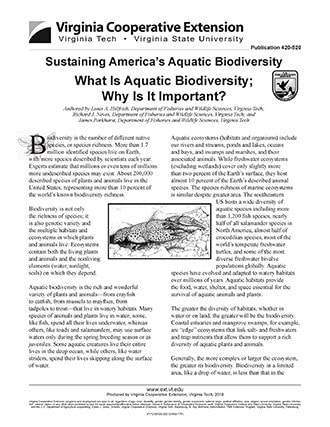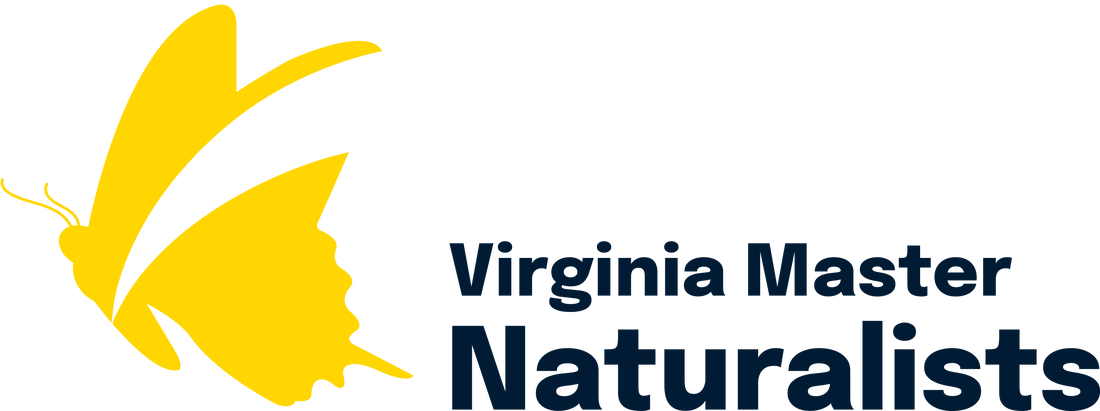 VMN volunteers edited all twelve publications in the Sustaining America's Aquatic Biodiversity series.
VMN volunteers edited all twelve publications in the Sustaining America's Aquatic Biodiversity series. One of the major ways Virginia Cooperative Extension accomplishes its mission of connecting the resources of Virginia Tech and Virginia State University to the people of Virginia is through its extensive online publications. Wondering how to start an organic farm? How to deal with high iron content in your well? How to help your family prepare for an emergency? How to recognize poison ivy? There are publications by VCE experts on all these topics and many, many more.
In order to make sure the information that is being shared is current, VCE requires that publications be updated every five years or else they will be removed from the publications website. In 2019, the twelve publications from the Sustaining America's Aquatic Biodiversity series were on that sunset list. Unfortunately, the original authors of most of the publications were no longer with Virginia Tech. Feeling that these publications had value for both new Virginia Master Naturalist trainees learning about aquatic ecology and for members of the public interested in aquatic creatures, I reached out to see if any Virginia Master Naturalist volunteers might like to help.
It turned out that there were many volunteers looking for at-home projects (and this was before COVID-19!) and many who had skills and knowledge related to aquatic species or writing and editing. We assembled 47 volunteers into twelve teams, sent each team a publication, and let them go to work. Every team did a fabulous job, returning the edited versions back on time. The edits were definitely needed; many of the publications had links that no longer worked and statistics about species diversity that were no longer accurate.
I was incredibly impressed by the work of the volunteers. They essentially rescued these publications so that more people can learn from them in the future. They also demonstrated that this method is a viable one for completing a task of this type. I have recommended to my other natural resource colleagues at VCE to consider engaging VMNs if they need help with future publication revisions. In addition, working with the volunteers on this publication project gave me the confidence to engage a larger group of VMN volunteers in a new project to edit all the captions from our collection of 75+ continuing education webinar videos. Thank you to all of the volunteers who contributed!
You can find the Sustaining America's Aquatic Biodiversity publications on the VCE publications site. You can also find links to the publications on our VMN aquatic ecology curriculum page and at the end of this article.
What is aquatic biodiversity; Why is it important?
Why is aquatic biodiversity declining?
Homes for Aquatic Animals
Freshwater Mussel Biodiversity and Conservation
Crayfish Biodiversity and Conservation
Freshwater Fish Biodiversity and Conservation
Selected Freshwater Fish Families
Frog Biodiversity and Conservation
Salamander Biodiversity and Conservation
Turtle Biodiversity and Conservation
Freshwater Snail Biodiversity and Conservation
Aquatic Insect Biodiversity and Conservation
In order to make sure the information that is being shared is current, VCE requires that publications be updated every five years or else they will be removed from the publications website. In 2019, the twelve publications from the Sustaining America's Aquatic Biodiversity series were on that sunset list. Unfortunately, the original authors of most of the publications were no longer with Virginia Tech. Feeling that these publications had value for both new Virginia Master Naturalist trainees learning about aquatic ecology and for members of the public interested in aquatic creatures, I reached out to see if any Virginia Master Naturalist volunteers might like to help.
It turned out that there were many volunteers looking for at-home projects (and this was before COVID-19!) and many who had skills and knowledge related to aquatic species or writing and editing. We assembled 47 volunteers into twelve teams, sent each team a publication, and let them go to work. Every team did a fabulous job, returning the edited versions back on time. The edits were definitely needed; many of the publications had links that no longer worked and statistics about species diversity that were no longer accurate.
I was incredibly impressed by the work of the volunteers. They essentially rescued these publications so that more people can learn from them in the future. They also demonstrated that this method is a viable one for completing a task of this type. I have recommended to my other natural resource colleagues at VCE to consider engaging VMNs if they need help with future publication revisions. In addition, working with the volunteers on this publication project gave me the confidence to engage a larger group of VMN volunteers in a new project to edit all the captions from our collection of 75+ continuing education webinar videos. Thank you to all of the volunteers who contributed!
You can find the Sustaining America's Aquatic Biodiversity publications on the VCE publications site. You can also find links to the publications on our VMN aquatic ecology curriculum page and at the end of this article.
What is aquatic biodiversity; Why is it important?
Why is aquatic biodiversity declining?
Homes for Aquatic Animals
Freshwater Mussel Biodiversity and Conservation
Crayfish Biodiversity and Conservation
Freshwater Fish Biodiversity and Conservation
Selected Freshwater Fish Families
Frog Biodiversity and Conservation
Salamander Biodiversity and Conservation
Turtle Biodiversity and Conservation
Freshwater Snail Biodiversity and Conservation
Aquatic Insect Biodiversity and Conservation


 RSS Feed
RSS Feed